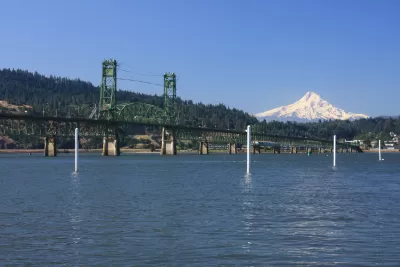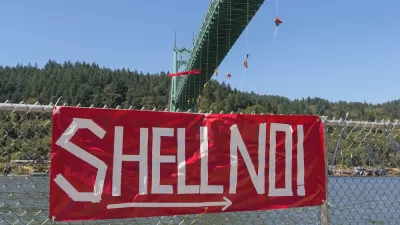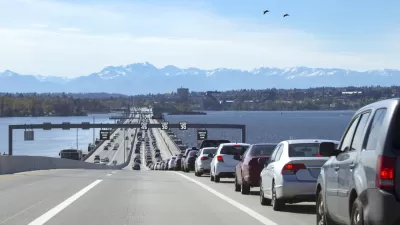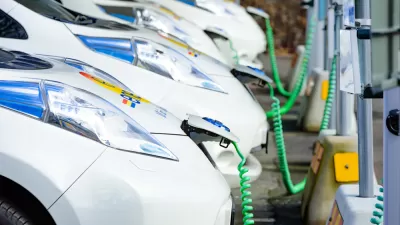The package, which doesn't tax walking and running shoes, went to the legislature on June 30. It includes a ten cents per gallon gas tax, a 0.10 percent payroll tax, a $15 tax on new bikes costing at least $200, and a potential toll on I–205.

"The plan will raise nearly $3 billion in taxes and fees over the next eight years," reports Pat Dooris for KGW–TV. In addition to the gas tax, bike tax, payroll tax, and potential toll, HB 2017 raises motor vehicle registration fees and adds "a tax on car sales that will fund rebates for purchases of electric cars," reports Gordon R. Friedman for The Oregonian, who indicates that a "tentative deal" had been reached on June 28 between Democratic Gov. Kate Brown and the Democratic-controlled legislature.
"The payroll tax would fund a statewide account for public transportation," adds Dooris. "It would help push buses into more rural areas and allow small towns to create more robust public systems, according to Rep. Cliff Bentz, a Republican from Ontario and State Senator Lee Beyer, (D) Springfield."
Gas tax revenues, which can't be spent on public transit due to constitutional restrictions, would pay for road and bridge projects. Highway widenings are notably mentioned to reduce congestion, including adding a lane in each direction to "Interstate 205 and the Abernethy Bridge which carries I-205 across the Willamette River in Oregon City," adds Dooris.
“More likely we’re probably looking at some tolling on 205 as a way to have to do that,” said Beyer. “That decision has not been made but it’s a likelihood. It’s a very expensive projects and within existing money we don’t have money to do that."
The Abernethy Bridge would be replaced, according to Friedman of The Oregonian. He provides more details on how the bipartisan consensus was reached on the bill and a related issue, the state's low-carbon fuel standard, or "clean fuels" law.
Future of Landmark Road Usage Charge?
OReGO, the nation's only actual vehicle-mile-traveled fee (called a road usage charge) program, is now two-years old, having begun operation on July 1, 2015 for up to 5,000 volunteer motorists who are charged 1.5 cents per mile driven, and credited the state gas taxes they paid at the pump. California and Colorado have completed trial programs, and Washington and Hawaii are expected to start pilots soon.
HB 2017 "would set up a system to charge vehicles that do not run on gas, a fee based on the miles they travel each year," adds Dooris, suggesting OReGO could morph into a mandatory program only for electric vehicles that lack gas tanks. If so, this would be a more equitable way to charge EV motorists than is currently done by many states that charge a flat, annual registration fees of $100–$200 for electric vehicles [see EV fees] and many even for hybrid vehicles even though they are not plug-in vehicles.
If the transportation legislation is passed in its current form and signed by Gov. Brown, Oregon will become the eighth state (after West Virginia) this year to increase its gas tax. Perhaps more significantly, it will also add to the "firsts" for the Beaver State when it comes to state transportation funding:
- First to charge a gas tax in 1919.
- First to operate a road usage charge in 2015.
- First to charge a bike tax.
Hat tips to AASHTO Daily Transportation Update and Elliot Njus, The Oregonian.
FULL STORY: Transportation bill would collect $3 billion in taxes, fees

Alabama: Trump Terminates Settlements for Black Communities Harmed By Raw Sewage
Trump deemed the landmark civil rights agreement “illegal DEI and environmental justice policy.”

Planetizen Federal Action Tracker
A weekly monitor of how Trump’s orders and actions are impacting planners and planning in America.

The 120 Year Old Tiny Home Villages That Sheltered San Francisco’s Earthquake Refugees
More than a century ago, San Francisco mobilized to house thousands of residents displaced by the 1906 earthquake. Could their strategy offer a model for the present?

Ken Jennings Launches Transit Web Series
The Jeopardy champ wants you to ride public transit.

BLM To Rescind Public Lands Rule
The change will downgrade conservation, once again putting federal land at risk for mining and other extractive uses.

Indy Neighborhood Group Builds Temporary Multi-Use Path
Community members, aided in part by funding from the city, repurposed a vehicle lane to create a protected bike and pedestrian path for the summer season.
Urban Design for Planners 1: Software Tools
This six-course series explores essential urban design concepts using open source software and equips planners with the tools they need to participate fully in the urban design process.
Planning for Universal Design
Learn the tools for implementing Universal Design in planning regulations.
Clanton & Associates, Inc.
Jessamine County Fiscal Court
Institute for Housing and Urban Development Studies (IHS)
City of Grandview
Harvard GSD Executive Education
Toledo-Lucas County Plan Commissions
Salt Lake City
NYU Wagner Graduate School of Public Service





























